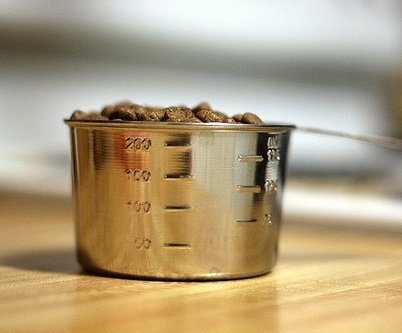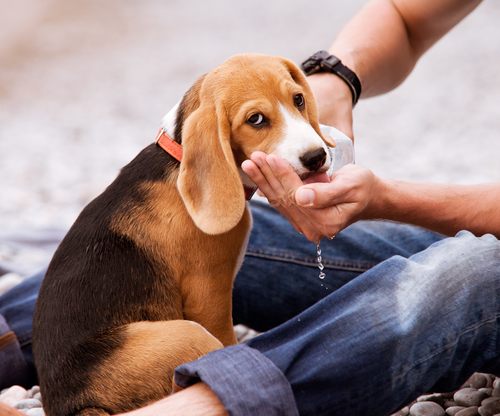
Newborn puppy’s eyes open between 10 and 14 days of age. This, like all of the other developments that occur in the first few weeks of life, is exciting for those who are watching the puppies grow and for the puppies themselves. What can you expect during the first one to eight weeks of puppy development ?
Puppies start their lives dependent on their mothers. They rely on their dog moms to feed them, keep them safe, and even help them expel waste from their body. The first few days of a puppy’s life might see uneventful because they are mostly sleeping, but lots of big changes are happening for a pup of this age.
Contents
Physical Development
As stated earlier, puppies are born with their eyes closed and don’t open them until about the second week of their life. Even though their eyes open at this time, they still aren’t able to see all that well. As their eyes open further, their vision improves and, if you look closely, you’ll likely notice they have gray-blue hued eyes. This won’t last either—puppies develop their adult eye color later in life (which can remain gray or blue) and all have gray-blue eyes when they are puppies. Their complete vision develops around eight weeks of age.
In addition to their eyes, puppies are also born with closed ears. This is less noticeable if you’re watching the puppy development, but their ears tend to open around 14 to 18 days of age. This means that puppies won’t be able to hear much until past the second week of their lives. Their hearing continues to develop in the early weeks of their lives, reaching full development around eight weeks.
Puppies, like all baby animals and humans, take some time to develop the strength to support their own weight—even though, in a puppy’s case, it might be a pound or less. During the first two weeks of their lives, puppies tend to scoot around on their bellies, pushing their legs and working on increasing the muscle strength. Mom will also help with moving puppies around when needed. Puppies tend to stand around 15 to 21 days, but don’t really walk at that point. It’ll be around the third or fourth week you’ll see your puppies starting to walk, but they’ll be wobbly and likely fall often.
Puppies, like human babies, are born without teeth. Unlike human babies, however, their only have their baby teeth for about a month. These baby teeth, also known as milk teeth, develop around two to four weeks of age. Puppies can begin losing their teeth as early as eight weeks and the process continues throughout the first several weeks of the puppy’s life. Most dogs have all of their adult teeth by the time they reach one year of age.
Puppy Vision
Puppies are born blind with their eyes closed. Their eyes usually don’t open until they’re approaching the second week of their lives. Seeing a puppy’s eyes open for the first time can be very exciting because you know it’s the first step in a month-long process of learning and exploring.
It’s important to assess a puppy’s vision once his eyes open. After his eyes are open, toss a cotton ball into the air without making a sound in front of the puppy. The movement should catch his eye and his attention. He might not know what is happening or what the action means, but if a puppy’s vision is developing as it should, he’ll follow the movement of your hand as you’re tossing. If you notice he has no reaction or it seems something is off, it’s important to have a vet assess the puppy’s vision.
Puppies can have eye infections that develop before they’ve even opened their eyelids. You might see some swelling or discharge coming from their closed eyes and, if you do, it’s important to take the puppy to the vet or have the vet pay a house call to check on the puppy. Your vet will likely open the puppy’s eye (even if they haven’t opened on their own yet) and treat the infection with an antibiotic cream.
Remember, not treating an infection can cause long-term problems with vision or even blindness, so if you suspect that there might be a problem, it’s better to err on the side of caution.
It’s also possible for a puppy to hurt their eyes once they are up and moving around. This can also happen if something occurs in the whelping box that injures the pup’s eye. There have been occasions when newborn pups have experienced eye irritation, corneal scratches, or problems with their eyelashes before they were even a couple of days old.
If at any time after your pup has opened his eyes and you notice discharge or rubbing, it’s a good idea to have the issue checked out by a vet. Most eye problems are not a big deal if treated quickly.
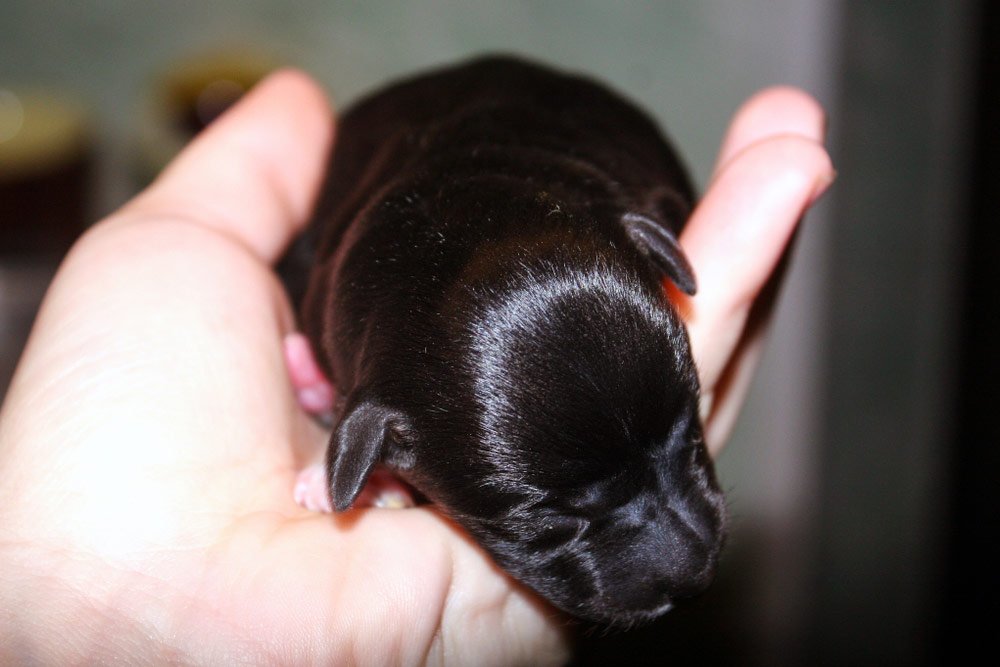
Sometimes puppies are born with congenital eye problems. These can include:
- Missing eyes
- Small eyes
- Choroidal hypoplasia
- Juvenile cataracts
- Detached retinas
Veterinary attention is required to treat all of these conditions. Puppy’s eyes, even more so than the rest of their body, are incredibly vulnerable and susceptible to injury. Eye health issues can be serious, but most puppies recover from problems that develop with their eyes when they are young.
As long as you treat the problem quickly and seek professional attention if you notice a problem, your puppy will live along and happy life, even if there is a long-term vision issue that develops. The important thing is to have a vet assess anything you think is out-of-the-norm.
Behavioral Development
The precocious, active pups we think of in early life aren’t born that way. During the first couple of weeks of their lives, all puppies do is sleep and eat. After a couple of weeks, when their eyes and ears open, they begin to explore their surroundings. At around 21 days, puppies start to learn about their lives as dogs. This is a time when they are learning a great deal from their mother and all of the things they learn will help them later in life.
Puppies also begin to socialize around this time with their litter mates. It’s also an important time to expose them to human contact. You can hold puppies during the first couple of weeks of their lives, but mother dogs tend to be very protective and interacting with the pups can be risky. By the third week of their lives, however, pups are ready to be handled and can begin to play. The more you introduce a puppy too between weeks three and seven the better because the seventh and eighth weeks of a puppy’s life tend to be when they are most fearful of new things.
Caring for the Health of Newborn Puppies
Mother dogs do the majority of the work during the first couple of weeks of a puppy’s life. If you are caring for orphaned puppies during the first couple of weeks, you’ll be doing a lot of work as a surrogate mom. Puppies need to be fed every two hours, burped, and assisted with defecation and urination. Caring for newborn puppies as a surrogate mother is a full-time job. They require round-the-clock feeding every two hours or so, including overnight, and need assistance with even the most of bodily functions. Only under emergency circumstances should a human stand in as a mother for newborn pups. A mother dog, even a surrogate mother dog, is always a better option than human care.
These are all things mother dogs do and, in most cases, even if you are responsible for puppies during the first eight weeks of their life, you won’t need to worry too much about these tasks.
Puppies tend to be weaned off their mother’s milk between five and seven weeks of age. By this time, they’ve already been wandering off from their whelping box for a couple of weeks and exploring their surroundings. If you are leaving the puppies at home when you can’t monitor them, you’ll want to keep mom and pups in an exercise pen that offers a decent amount of space but doesn’t give puppies the full run of your home.
It’s also important to have a vet see the puppies in the first few weeks of their lives. Even healthy pups should be checked out. However, if a dog is not growing at the same speed as their litter mates, it’s especially important to schedule a checkup. Any sign of illness at this age needs to be assessed by a doctor.
Feeding Developing Puppies
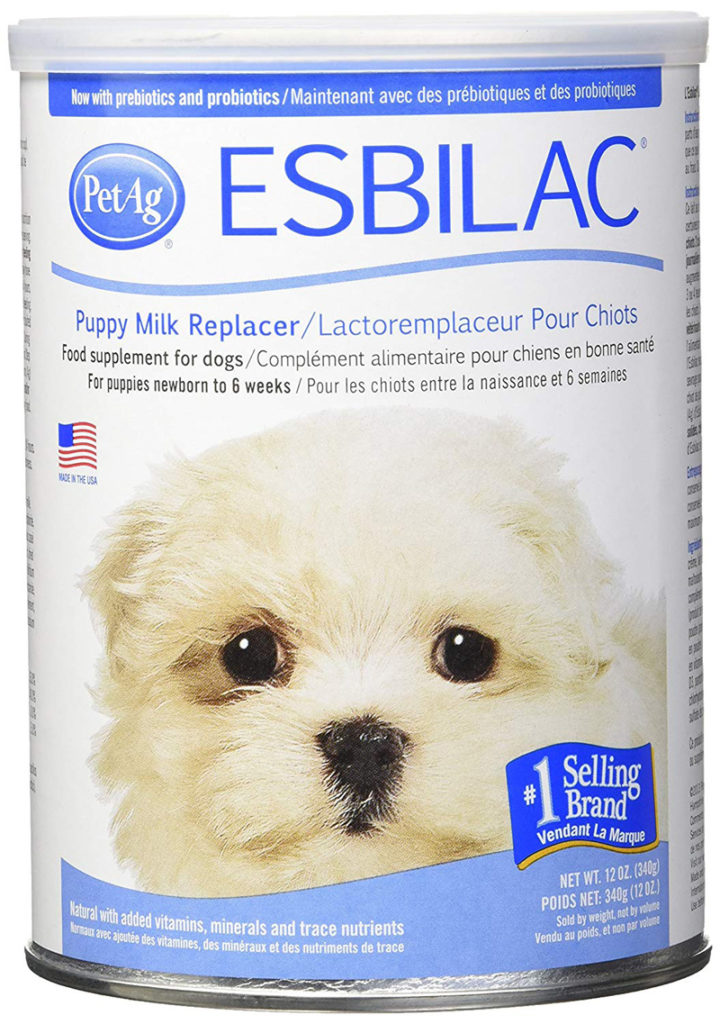
For the first three weeks or so of their lives, puppies get all of their food from their mother. Mother dog breast milk has all the nutrients puppies need and there is usually no need to supplement. However, if a puppy has been orphaned or needs extra nutrition, puppy formula will need to be bottle fed.
Once a puppy’s teeth have begun to come in, mom will start the weaning process. She knows it’s time because she can feel the teeth when she’s feeding. If you notice a mother dog pushing her puppies away when they are trying to feed—this is usually an indication that the teeth are coming in. However, puppies will still nurse for a few weeks after teeth have erupted, but it will be less frequent. This is the time you need to begin to transition the pups to canned food or kibble.
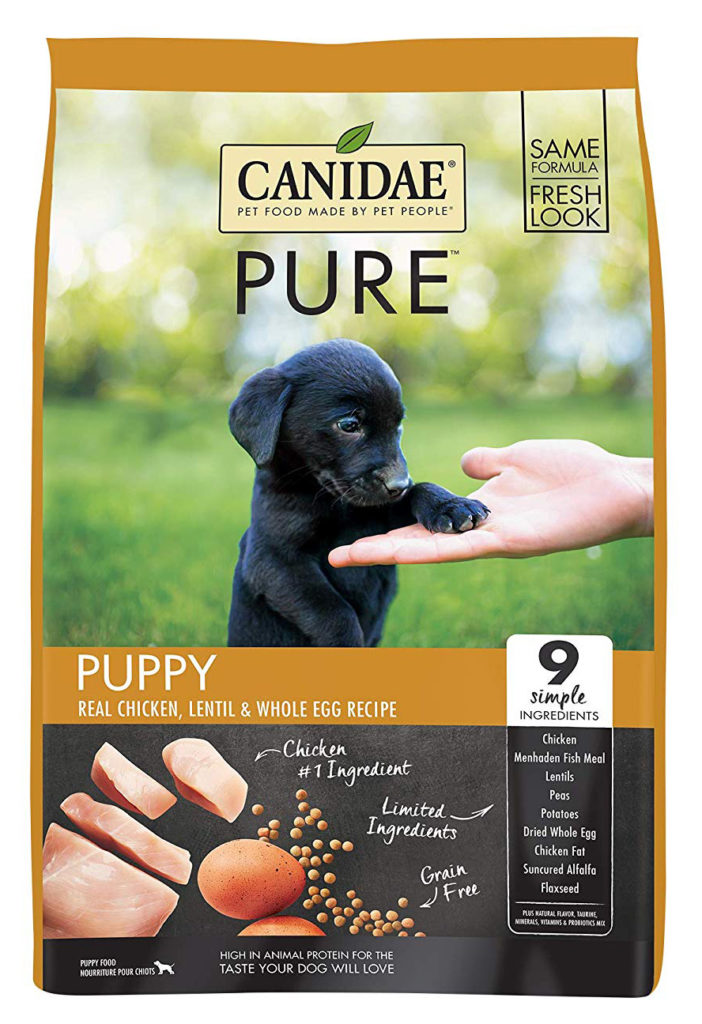
It’s important that puppy food is formulated for their nutritional needs and that their kibble is not too hard. If you buy puppy kibble, make sure you add some water or warm puppy formula to make it softer. You’ll also need to show the puppies how to eat and encourage them to try the puppy food by putting some on your finger and letting them sample it. Most pups are fully weaned between six and seven weeks of age and are able to eat on their own without hesitation around that time. Puppies should never be offered food until they have begun the weaning process unless they’ve been orphaned. Introducing a puppy to food too early can discourage it from nursing, which can lead to nutritional deficiencies.
Training Puppies
Puppies might be little and need help with a lot of things in their world, but they are also smart and eager to learn. Once a puppy has open eyes and ears and is moving around you can begin the training process. This usually occurs around three to four weeks of age, when they are able to potty on their own, see, hear, and walk. Puppies still need to stay with their mothers during this time, but they are able to explore the world and interact with other dogs and humans.
Around three to four weeks you’ll want to begin working on potty training and crate training. This is important whether the puppy will live with you or go on to live in another home. It’s also important for puppies to socialize during the first few weeks of their lives, especially from four to seven weeks. This is a great time to allow people to handle puppies (very carefully) and to expose them to new sights and sounds.
Most Important Things Puppies Need During Their First Few Weeks of Life
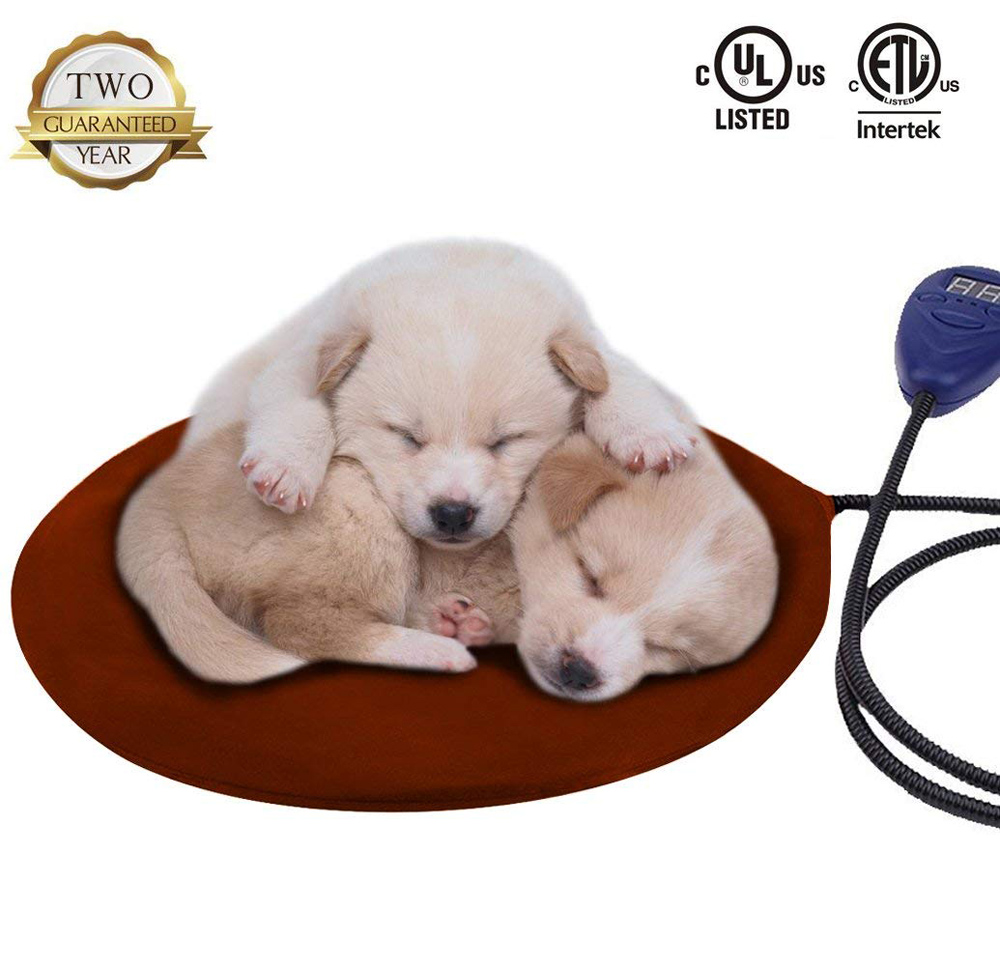
- Mother dogs to feed them and care for them
- Surrogate mothers—if they are orphaned—to feed and care for them
- A warm, enclosed environment with blankets and supplemental heating
- Protection from bright lights, loud noises, and too much handling until they are at least a month old
Witnessing puppies from birth until they are ready to be adopted into their forever homes can be exciting and enriching. Puppies are cute, but they also have a lot of needs, especially when they are very young. If you’re lucky enough to be responsible for the care of very young pups, it’s important to know what you need to do and how you can support the mother dog while she cares for her babies.
I grew up in a household that was filled with animals. I believe that my fate as a dog-loving person was sealed in early childhood since my parents owned several dogs of varying sizes and breeds. There was no choice but to take care of and learn about dog habits and the best animal care practices — otherwise, I’d be clueless about how to go about the creatures I was surrounded by day and night.
As a life-long puppy lover, I know a thing or two about dogs and how to go about caring for them in the best way possible. Although I’m not a professionally trained dog behaviorist, trainer, or veterinarian, all of my knowledge and experience with canines comes from a place of love and a deep-rooted passion for dogs and animals in general.
Seeing as dogs kept me company throughout every stage of my life, I decided to follow a different path in my academic life and obtained a Bachelor’s and Master’s degrees in Marketing Management and Digital Advertising, which ultimately allowed me to combine my professional training and personal experience by creating the ultimate dog lover’s resource website! Along with my husband, Dave, I run MySweetPuppy for like-minded dog lovers who want to have a single, clear, and reliable information source about anything and everything related to dogs and their well-being.

